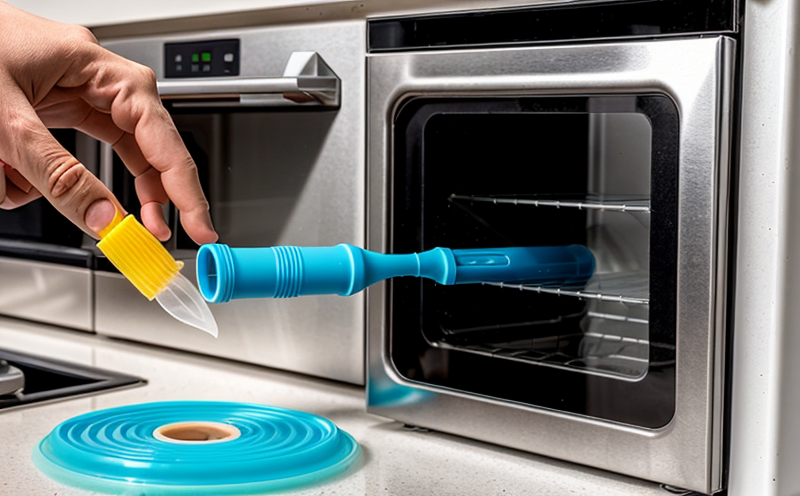ASTM D638 Plastics Mechanical Properties Testing for Household Applications
The ASTM D638 standard is a widely recognized protocol used to measure the tensile strength and elongation at break of plastic materials. This test method is essential in ensuring that household plastics meet specific performance requirements, thereby enhancing product safety and durability.
In household products such as toys, kitchen utensils, and furniture, the mechanical properties of plastics play a crucial role in determining their suitability for use. ASTM D638 helps manufacturers understand how their materials will behave under stress, which is critical for designing safe and reliable products.
The test involves breaking cylindrical specimens under tension until failure occurs. The tensile strength (psi) and elongation at break (%) are recorded to provide a quantitative measure of the material's performance. These parameters are vital in ensuring that household plastics can withstand typical usage conditions without breaking or deforming excessively.
Proper specimen preparation is crucial for accurate results. Specimens should be cut from the plastic samples according to ASTM D638 specifications, which include dimensions and tolerances. The specimens must also be conditioned to a standard temperature and humidity before testing to ensure consistent performance.
The testing apparatus used in ASTM D638 includes an electronic universal testing machine equipped with appropriate grips for holding the cylindrical specimen. The test is conducted at room temperature unless otherwise specified, ensuring that results are comparable across different laboratories.
Reporting of test results follows strict guidelines outlined by ASTM D638. This includes providing detailed information about the specimen dimensions, environmental conditions during testing, and the ultimate tensile strength (UTS) and elongation values obtained. Compliance with these reporting standards ensures consistency in data interpretation and facilitates comparability between different laboratories.
The results of ASTM D638 tests are used by quality managers to ensure product compliance, by compliance officers to validate that products meet regulatory requirements, and by R&D engineers to optimize material selection and formulation processes. For procurement teams, these test results serve as a critical factor in evaluating suppliers' capabilities and ensuring the reliability of purchased materials.
Understanding the implications of ASTM D638 testing for household plastics can help stakeholders make informed decisions regarding product design, manufacturing processes, and supply chain management. By adhering to this standard, manufacturers can produce safer, more durable products that meet both consumer expectations and regulatory standards.
Why It Matters
The importance of ASTM D638 testing in household plastics cannot be overstated. Ensuring the mechanical integrity of materials used in everyday items is paramount for maintaining user safety and product performance. Here are several reasons why this testing matters:
Enhances Safety: Properly tested plastics ensure that products do not break or deteriorate under normal use, reducing the risk of injury.
Improves Durability: By selecting materials with appropriate mechanical properties, manufacturers can extend the useful life of their products.
Aids in Regulatory Compliance: Meeting ASTM D638 standards helps avoid potential legal issues and enhances brand reputation.
Sustains Quality Control: Consistent testing ensures that every batch of plastic material meets the required performance criteria, maintaining high-quality standards.
Overall, ASTM D638 plays a vital role in ensuring that household plastics are both safe and functional, contributing to the overall well-being of consumers and the integrity of the manufacturing industry.
International Acceptance and Recognition
The ASTM D638 standard is recognized globally for its accuracy and reliability in measuring tensile strength and elongation at break. Laboratories across Europe, Asia, and North America routinely use this method to ensure product quality.
ISO 17025-accredited laboratories adhere strictly to ASTM D638 protocols, ensuring consistent results that are accepted worldwide.
The standard is frequently cited in international trade agreements, making compliance with ASTM D638 a necessity for exporting household plastics internationally.
By leveraging ASTM D638 testing, manufacturers can ensure their products meet global standards and gain competitive advantages by demonstrating adherence to recognized protocols.
Environmental and Sustainability Contributions
The use of ASTM D638 testing in household plastics not only enhances product safety but also contributes positively to environmental sustainability. Here are some ways this testing method supports these goals:
Recycling Optimization: Understanding the mechanical properties of plastics allows for better recycling processes, reducing waste and conserving resources.
Eco-friendly Material Selection: By identifying materials that meet ASTM D638 standards, manufacturers can choose more sustainable options, promoting a greener production process.
Energy Efficiency: Products with enhanced durability due to proper testing require less frequent replacement, leading to reduced energy consumption over their lifecycle.
In summary, ASTM D638 testing supports the development of environmentally responsible products, aligning manufacturing practices with sustainability goals.





